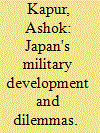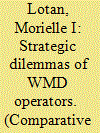|
|
|
Sort Order |
|
|
|
Items / Page
|
|
|
|
|
|
|
| Srl | Item |
| 1 |
ID:
163810


|
|
|
|
|
| Summary/Abstract |
Is India shifting to a nuclear counterforce strategy? Continued aggression by Pakistan against India, enabled by Islamabad's nuclear strategy and India's inability to counter it, has prompted the leadership in Delhi to explore more flexible preemptive counterforce options in an attempt to reestablish deterrence. Increasingly, Indian officials are advancing the logic of counterforce targeting, and they have begun to lay out exceptions to India's long-standing no-first-use policy to potentially allow for the preemptive use of nuclear weapons. Simultaneously, India has been acquiring the components that its military would need to launch counterforce strikes. These include a growing number of accurate and responsive nuclear delivery systems, an array of surveillance platforms, and sophisticated missile defenses. Executing a counterforce strike against Pakistan, however, would be exceptionally difficult. Moreover, Pakistan's response to the mere fear that India might be pursuing a counterforce option could generate a dangerous regional arms race and crisis instability. A cycle of escalation would have significant implications not only for South Asia, but also for the broader nuclear landscape if other regional powers were similarly seduced by the temptations of nuclear counterforce.
|
|
|
|
|
|
|
|
|
|
|
|
|
|
|
|
| 2 |
ID:
132791


|
|
|
|
|
| Publication |
2014.
|
| Summary/Abstract |
Japan merits serious study as a diplomatic and strategic power in the twenty-first century for several reasons. Although her population size is declining because of shrinking birth rates and restrictive immigration, the ratio of seniors is increasing --with increasing demands for pensions and state-supported safety nets - and the number of younger participants in the growth of her economy and public life is declining, the Japanese people have demonstrated a high degree of discipline and internal social cohesion at times of war, peace and crisis. An example is their fortitude during the recent (2011) nuclear and tsunami disasters. After 1945, her social and political values stress the importance of harmony and consensus building in her domestic arrangements, and the Japanese people and ruling elites value rejection of war as the sovereign right of the Japanese state. For this reason, domestic public opinion matters in the making and orientation of Japan 's external policies following her defeat in 1945 and with the establishment of a pacifist constitution and constitutional democracy. The population is not easily swayed by radical political and nationalistic rhetoric, even though in recent years, nationalist sentiment has grown in Japan and this was signalled by the election of Prime Minister S/2in;o Abe (2012). Still, despite the centre-right tilt in Japanese public and elite opinion in recent years, the Japanese people demand a thorough assessment of new moves to shift strategic policy and constitutional arrangements on defence issues.
|
|
|
|
|
|
|
|
|
|
|
|
|
|
|
|
| 3 |
ID:
141747


|
|
|
|
|
| Summary/Abstract |
The increase in nuclear clients appears to be forthcoming, and with it a possible increase for nuclear use. Deterrence must focus on targeting nuclear decision makers and tailoring a strategy toward all levels of nuclear command and control, including tactical levels of decision making. What can be learned from historical examples of WMD dilemmas and the consequential role of a WMD operator in nuclear decision-making? Namely, that operators are in fact decision makers and not simply executers. The article analyzes the role of WMD operators as such decision makers by reflecting on three case studies that demonstrate operator dilemmas in light of standard operating procedures at critical moments of WMD engagement, and their results. It concludes by laying out an effective base on which to include operators in tailored deterrence efforts, as well as filling a need for creative and practical nuclear strategy efforts.
|
|
|
|
|
|
|
|
|
|
|
|
|
|
|
|
|
|
|
|
|